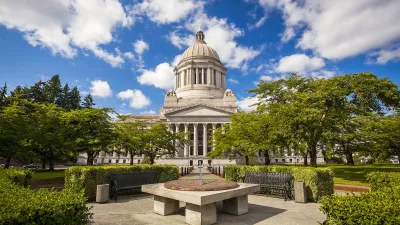The extremely strict proposal would eliminate sharp rent increases, but could stifle housing construction and worsen the city's housing crisis.

Bill Lindeke describes the details of St. Paul's proposed rent stabilization ordinance, which, if passed by voters in November, "would place unprecedented restrictions on the construction of new housing," leaving "an open question what it would do to the city’s housing market."
As proposed, "[t]he law would cap rent increases for all of the city’s 65,000 rented homes at 3% per year, but includes a complicated list of factors that allow landlords to apply for a variances — things like property taxes, maintenance issues, capital improvements (only if needed to bring a building to code), and a few others." According to Shane Phillips, author of The Affordable City, "historically, rent control policies have sometimes made housing crises worse by reducing the size and quality of the housing supply." Consequently, most of today's rent stabilization programs are "explicitly designed to ensure that the housing supply keeps growing."
Lindeke points to three issues with the St. Paul plan that could exacerbate the city's housing crisis. First, the policy does not exempt new construction, which could discourage developers from building in the first place. Second, the plan does not account fo inflation, yet "[a]lmost every other program is pegged somehow to the consumer price index (CPI) or enlists a committee that sets annual rates based on local conditions." The third factor is the unusual step of controlling rent on vacant units, rather than for each individual tenant, creating a situation "rife for potential corruption" and discrimination.
"if the HENS proposal passes, it would put St. Paul on its own," says Lindeke, and "will almost certainly cause other problems that would make the housing crisis even worse."
FULL STORY: If approved by voters, St. Paul’s rent control ordinance would be among the strictest in the world

Study: Maui’s Plan to Convert Vacation Rentals to Long-Term Housing Could Cause Nearly $1 Billion Economic Loss
The plan would reduce visitor accommodation by 25,% resulting in 1,900 jobs lost.

North Texas Transit Leaders Tout Benefits of TOD for Growing Region
At a summit focused on transit-oriented development, policymakers discussed how North Texas’ expanded light rail system can serve as a tool for economic growth.

Using Old Oil and Gas Wells for Green Energy Storage
Penn State researchers have found that repurposing abandoned oil and gas wells for geothermal-assisted compressed-air energy storage can boost efficiency, reduce environmental risks, and support clean energy and job transitions.

Private Donations Propel Early Restoration of Palisades Playground
Los Angeles has secured over $1.3 million in private funding to restore the Pacific Palisades playground months ahead of schedule, creating a modern, accessible space that supports community healing after recent wildfires.

From Blight to Benefit: Early Results From California’s Equitable Cleanup Program
The Equitable Community Revitalization Grant (ECRG) program is reshaping brownfield redevelopment by prioritizing projects in low-income and environmental justice communities, emphasizing equity, transparency, and community benefits.

Planting Relief: Tackling Las Vegas Heat One Tree at a Time
Nevada Plants, a Las Vegas-based nonprofit, is combating the city’s extreme urban heat by giving away trees to residents in underserved neighborhoods, promoting shade, sustainability, and community health.
Urban Design for Planners 1: Software Tools
This six-course series explores essential urban design concepts using open source software and equips planners with the tools they need to participate fully in the urban design process.
Planning for Universal Design
Learn the tools for implementing Universal Design in planning regulations.
Ascent Environmental
Borough of Carlisle
Institute for Housing and Urban Development Studies (IHS)
City of Grandview
Harvard GSD Executive Education
Toledo-Lucas County Plan Commissions
Salt Lake City
NYU Wagner Graduate School of Public Service





























